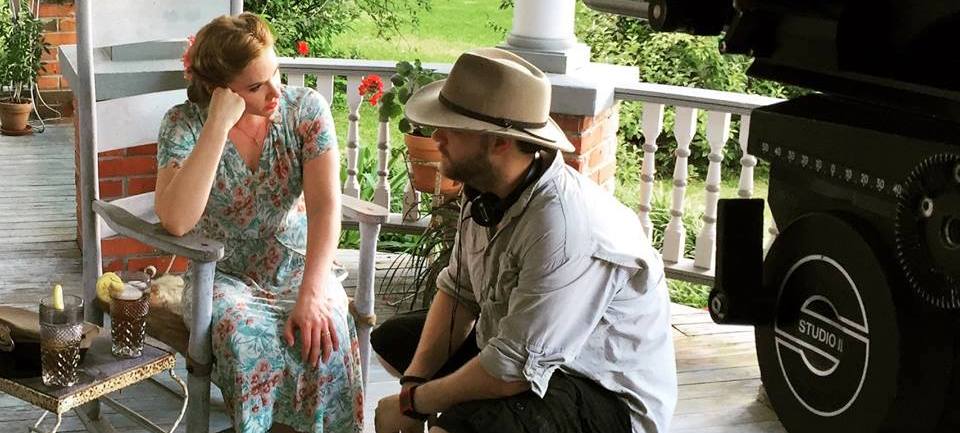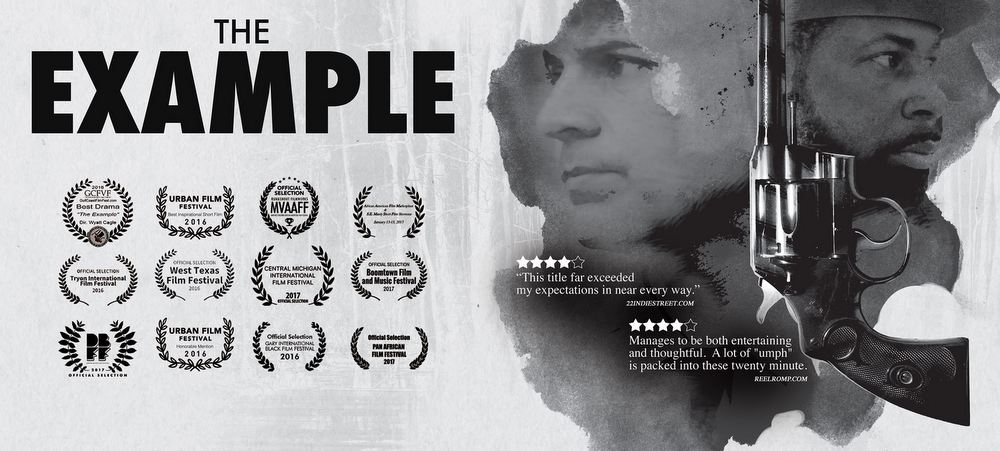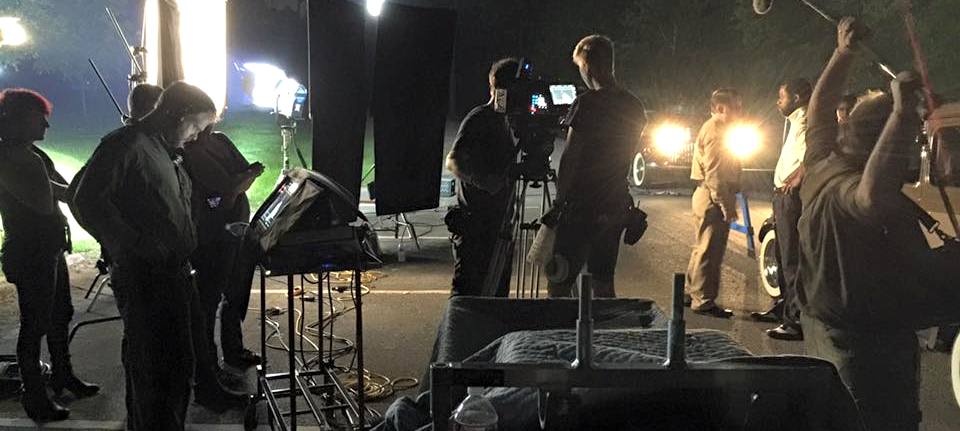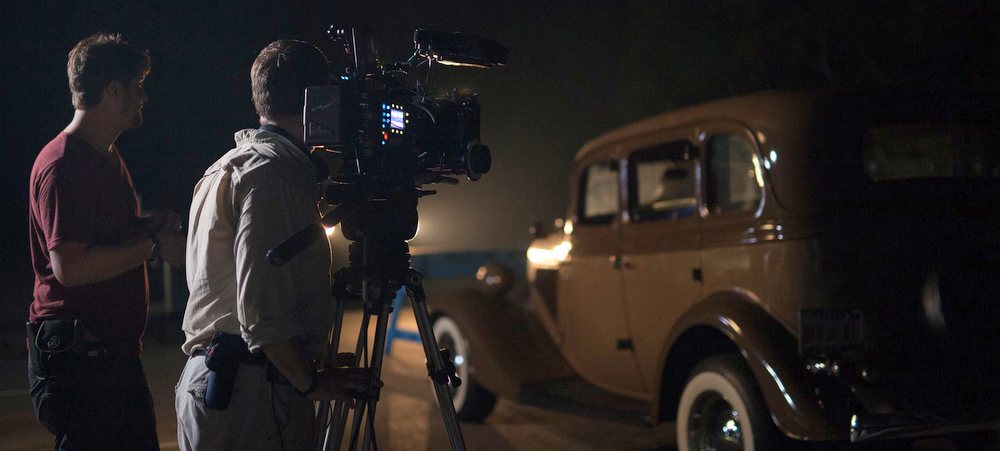
Wyatt Cage Directing Kate Robards in ‘The Example’
The idea for The Example started many, many years ago. Gordon Williams, the writer, found a blurb in a text book about the largest race riots in US history occurred in several major US cities and then it ended with Beaumont Texas. Gordon works in Beaumont and Wyatt Cagle grew up in the area. They had never heard a thing about this. That started them on a journey that lasted a decade. The two started producing a documentary about the event, which is still a possibility, and then decided to tell a small, personal story with this major historical event as the backdrop. Wyatt explain more about his film The Example below…
indieactivity: Did you start writing with a cast (You or any) in mind?
Wyatt: We didn’t have anyone in mind.
indieactivity: How long did you take to complete the script? (Do you have a writing process?)
Wyatt: Gordon and I were at a film festival, between screenings of our previous film, and I rattled off a father and son story idea. Gordon took the essence of that story and merged it beautifully into The Example. That first draft only took a month or so to write, but then we spent the next two years reworking it all the way up to the first day of shooting. The process for writing is very much a collaboration.
Gordon is the writer and he is excellent about taking conversations we have and weaving them into a cohesive narrative. Then I basically edit, rework, and challenge his words. We bang on the story till it breaks and then Gordon goes back and makes it stronger. He is great at that and a real blessing to the project. I love the trust we have in our relationship. With a delicate topic like race in America that trust was more important than ever.

indieactivity: When did you form your production company – and what was the original motivation for its formation?
Wyatt: CGL Studios was officially opened in 2008. I opened it because the film industry is a business and you have to treat it like a business. Part of that is having the right assets in place. One of those is a proper company.
indieactivity: What was the first project out of the gate?
Wyatt: I did several short films in high school and college. The ‘first’ project has been lost to time. I really can’t remember. The first project I did in college, which I hear is still being screened on campus, was called Ninja Rolls. A comedy about a wheelchair bound Ninja and his quest to eliminate a mysterious target. It is pretty bad but it is a great marker to show how much I’ve grown in the craft.
indieactivity: During production, what scene (that made the cut) was the hardest to shoot?
Wyatt: The spitting scene in The Example it really was uncomfortable for many members of the crew, including Gordon, the producer/writer. In terms of logistics, it was a really good shoot. We had a great AD team and all of our ducks in a row. It doesn’t always happen but this was a very smooth shoot. I did have to cut some camera setups on the second day of production, which was disappointing, but it reinforces the idea that you have to know your story. You have to know what is fat and what are the bones of the story. That way you know when you cut the shot it will not kill you in the edit.
indieactivity: What works better in this latest production that mightn’t have worked so well in the last one you did?
Wyatt: We invested more in audio. Both on set and in post. I had a great audio Tech Erik Kolflat on set and then Zap Boom Bang Studios in Houston did our mix with the very talented Mundo Gomez.

Wyatt Cagle with the crew on the set of “The Example”
indieactivity: You produced and directed The Example, what measure of input did it take to don these hats?
Wyatt: If you are directing at this level you have to produce at the same time. I was involved with all aspects at some level in pre-productions. I had Gordon and Kenneth Dupuis producing with me so it wasn’t so much pressure on one person. The entire time during pre-production I was switching back and forth from producer to director. But then once filming starts I go full director. Having two other producers allows me to focus on the movie and not worry about all the other things that happen on a film set. They then tell me at dinner all the exciting fires I missed.
indieactivity: Is there anything about the independent filmmaking business you still struggle with?
Wyatt: Financing. Just like everyone else. Every film is like starting a new business and setting everything up is difficult because it’s not the part that I enjoy. But it is an important part of the process that many people skip.
indieactivity: Where do you think your strengths line as a filmmaker?
Wyatt: I’m an editor at heart so I do everything for the edit. Because of that I can producer, shoot, and direct the shoot to be very efficient. I can tell very early on what will be cut from the end product. That way we are not overshooting and going over budget. This helped us on The Example.
indieactivity: Let’s talk finance, How did you finance the film?
Wyatt: We did a combination of crowdfunding with IndieGoGo and self-financing for The Example.
indieactivity: How much did you go over budget? How did you manage it?
Wyatt: We had two budgets. First was the market rate for all personal, equipment, art department, etc. Then we had our second budget that was what we knew we could get through relationships we have in our community. From there we knew what we absolutely had to raise to make it work. Doing our homework saved us from going over budget. We raised what we needed and we stuck to it.

Wyatt Cagle with Donald Kilgore setting up a scene on the set of The Example
indieactivity: How important is marketing? Do you think a project can make any dent without it these days?
Wyatt: Marketing is the second most important thing behind story. The wonderful thing is that it is easier than ever to make a film. The bad thing is that it is easier than ever to make a film. The level of noise in the market is the highest it has ever been. If you can’t get over that noise you will not succeed. It doesn’t matter how good your film is.
indieactivity: Can you tell us about your marketing activities on the project – and how it’s gone for you?
Wyatt: We are testing a lot of social media strategies for The Example and trying to find what will hit. So far I have been disappointed with our returns but we just keep having to try till we find that right combination to make a break.
indieactivity: What do you hope audiences get from your The Example?
Wyatt: I hope the audience asks questions. Most do and they want to talk about the film. That is why we really like to do screenings because people have their own interpretations of the film. Hearing those views always excites me.
indieactivity: What else have you got in the works after The Example?
Wyatt: I’m working on several short films for other filmmakers right now and I’m in the beginning process of my first feature film as a director/producer. Always looking for the next best film.
Richard Green Documentary, ‘I Know Catherine, The Log Lady’: Premiere in NYC, LA May 9th
Lynchian Doc I Know Catherine, The Log Lady Makes Hollywood Premiere 4/17, Rollout to Follow
In Camera by Naqqash Khlalid Launch on VOD April 29
Naqqash Khlalid’s Directs Nabhan Rizwan. In Camera stars an EE BAFTA Rising Star Award Nominee.
2025 Philip K. Dick Sci-Fi Film Festival Award Winners Announced
Vanessa Ly’s Memories of the Future Awarded Best PKD Feature
Dreaming of You by Jack McCafferty Debuts VOD & DVD for April Release
Freestyle Acquires “Dreaming of You” for April 15th Release
Hello Stranger by Paul Raschid set for London Games Festival & BIFFF
The film Is set for an April 10th Premiere at The Genesis Cinema in London (LGF) and BIFFF
Daydreamers Official Trailer by Timothy Linh Bui: Released by Dark Star Pictures
Daydreamers Vietnamese Vampire Thriller – May 2nd release









